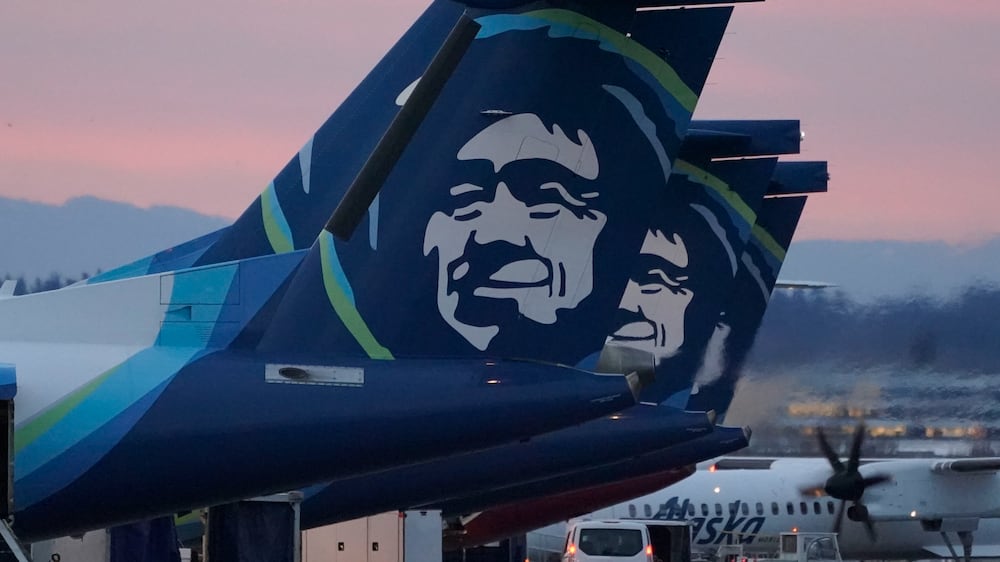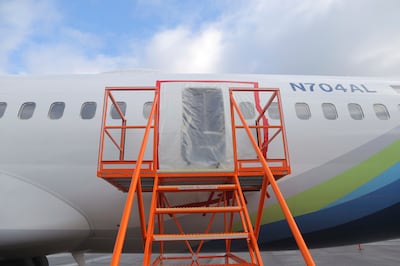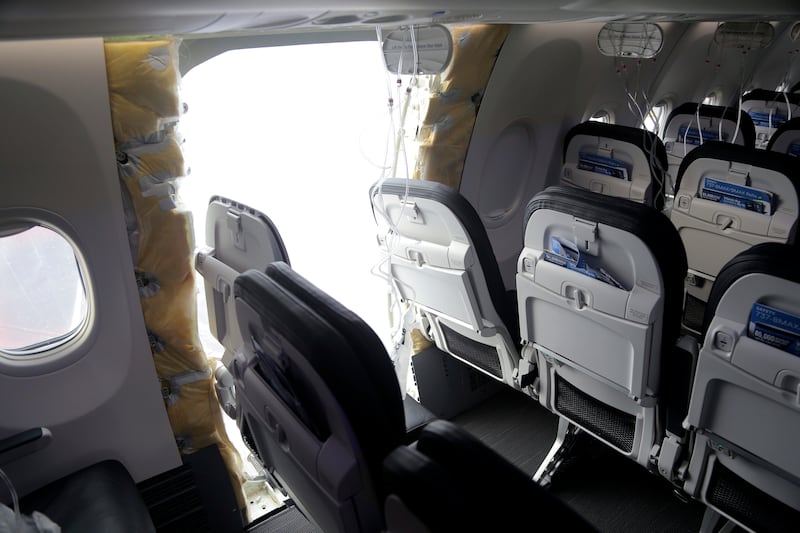Boeing's recovery from the high-profile near-disaster of a door panel flying off a 737 Max 9 jet mid-flight will take years as the US plane manufacturer seeks to rebuild its reputation, regain the confidence of regulators and airlines, and put an end to the production glitches plaguing its commercial aircraft unit.
The Arlington, Virginia-based company must become laser-focused on tightening quality control, improving safety checks and design, investing more heavily in training, overhauling its corporate culture and ensuring stricter supervision, analysts say.
“The challenges Boeing faces are not insurmountable, but the path to recovery is a marathon, not a sprint. It involves fundamental changes in corporate culture, design philosophy and operational transparency,” Linus Bauer, founder and managing director of consultants BAA & Partners, told The National.
“For Boeing, the journey ahead involves not just addressing the technical and regulatory challenges but also winning back the heart and trust of the flying public through consistent, transparent and safety-first practices.”
The company's actions in the coming years will be “critical in shaping its legacy and its role in the future of aviation”, Mr Bauer said.
This will be no mean feat and Boeing has its work cut out amid heightened scrutiny of its manufacturing and inspection processes from regulators, airline customers, lawmakers and investigators. Last month, a Delta Air Lines Boeing 757 passenger plane's nose wheel fell off and rolled away as the jet lined up for take-off.
“The only thing Boeing can do is build better quality, which means zero defects on every product going through the factory,” George Ferguson, senior aerospace analyst at Bloomberg Intelligence, told The National.
“Unfortunately, I don't see a shortcut to this. It will be built slowly over months and years of no further problems.”
The Alaska Airlines incident last month has become the biggest crisis for Boeing since the entire global fleet of its Max jets was grounded in 2019 following two deadly crashes.
The US National Transportation Safety Board in its preliminary report on Tuesday into the January 5 incident showed that the door panel, known as a door plug, appears to have left the Boeing factory without four bolts designed to hold it in place.
Following the report, Boeing's president and chief executive Dave Calhoun said: “Whatever final conclusions are reached, Boeing is accountable for what happened.
“An event like this must not happen on an airplane that leaves our factory. We simply must do better for our customers and their passengers.”
The company is implementing a “comprehensive plan” to strengthen quality and the confidence of its stakeholders and is squarely focused on taking “significant, demonstrated action and transparency at every turn”, he said.
Alaska Airlines grounds Boeing 737 MAX 9 for checks after emergency landing

Passengers' safety perceptions
The 737 Max 9 incident has become a full-blown quality, safety and reputational crisis for Boeing that will slow plane production as the US Federal Aviation Authority (FAA) has barred the plane maker from boosting the existing 737 Max production rate, pending improvements in quality control.
A February 9 poll from the Associated Press-NORC Centre for Public Affairs Research showed that most US adults believe air travel is generally safe but only about two in 10 have a great deal of confidence that aeroplanes are being properly maintained or are safe from structural faults.
Only about 20 per cent are confident in the work that federal agencies, commercial airlines or airplane manufacturers do to uphold air safety.
While the US respondents have misgivings about aeroplane maintenance and structural faults, they are more confident in pilots and air-traffic controllers.
About four in 10 have a great deal of confidence that pilots and air-traffic controllers can maintain the safety of air travel, the survey showed.
The nationwide poll was conducted between January 25 and January 29.

A January poll by YouGov and The Economist found that 29 per cent of Americans positively rated the safety record of the Boeing 737 Max 9, while 32 per cent rated it negatively. Another 40 per cent said they did not know.
Some 48 per cent of the US respondents said that it is very important or somewhat important for them to know the model of the Boeing or Airbus airliner they will be flying in, the survey showed.
More Americans feel good about airline safety in general than about the Boeing 737 Max 9's safety, with 82 per cent of those surveyed positively rating the safety record of commercial airline travel.
Some 47 per cent of those surveyed saying they feel safer to fly rather than drive on a long-haul trip.
Back to basics
Aviation industry analysts say Boeing must shift its attention from making money to focusing on products, performance and people in order to halt the company's downward spiral over the last few years.
“There is a perception that Boeing lost focus on its engineering prowess and excellence. The move of headquarters to Chicago divorced corporate management from production and day-to-day production in Seattle,” aviation consultant John Strickland told The National.
“Boeing has to restore confidence by returning to the core values of producing safe and reliable products.”
Boeing said it has taken immediate action to strengthen quality, implementing a control plan to ensure all 737 Max 9 mid-exit door plugs are installed according to specifications.
It is also implementing plans to improve overall quality and stability across the 737 production system, it said. This includes additional inspections further into the supply chain and launching an independent assessment to bolster the quality management system at the Boeing Commercial Airplanes unit by an experienced safety expert.
The company also said it is opening its factory to 737 airline customers to conduct their own additional reviews, and “will fully and transparently” support the FAA’s investigation, audit and oversight actions.
“This added scrutiny – from ourselves, from our regulator and from our customers – will make us better. It’s that simple,” Mr Calhoun said.

Industrywide impact
In the wake of the 737 Max 9 incident, the aviation industry will have to put quality control at the top of its priorities going forward, industry experts say.
“I expect that as the FAA inspects suppliers and undertakes a manufacturing review, we'll see more inspectors at more of the supply base,” Mr Ferguson said.
“There may be some onshoring and consolidation too if the FAA determines they can't appropriately inspect part of the supply base or the subcontractor is too risky.”
There will be broad implications for the aviation industry that include a re-evaluation of regulatory frameworks, a push towards more resilient and diversified supply chains, and an increased emphasis on safety, according to Mr Bauer.
“The increased scrutiny on Boeing and its suppliers will have several impacts on the wider aviation industry. Both manufacturers and suppliers will face more stringent regulations and oversight, leading to increased compliance costs and potentially longer development timelines,” he said.
This will drive companies to invest in more advanced safety features and technologies to avoid similar pitfalls.
“Suppliers will face tighter scrutiny and higher standards from manufacturers seeking to avoid quality control issues, which could lead to consolidation in the supply chain,” Mr Bauer added.
Rivalry with Airbus
Boeing's latest crisis risks it ceding further market share to European rival Airbus, according to some analysts.
Airbus now has an opportunity to secure more orders from airlines re-evaluating their fleet strategies, in the wake of delivery delays at Boeing, particularly for narrow-body aircraft where the A320 family competes directly with the 737 Max.
“Airbus stands to benefit from Boeing's setbacks by capturing market share, strengthening industry relationships, and bolstering innovation and product development,” Mr Bauer said.
“Airbus can further solidify its relationships with suppliers, regulators, and customers by emphasising its commitment to safety and reliability. Investing in new technologies and aircraft could position Airbus favourably as the industry moves towards recovery and future growth.”
However, other analysts believe that the nature of the duopoly between the two main plane makers in the market limits options for airlines.
“Airbus cannot directly exploit Boeing's predicament – its order books are pretty full – though it can gain some possible customer switches over time,” Mr Strickland said.
It will be challenging for Airbus to benefit significantly from its rival's woes, given the European planemaker's backlog is long and they are also facing supply chain bottlenecks, so it will probably stick to its current plan for production rate increases, Mr Ferguson said.
“Provided Boeing gets quality in hand over the next six months or so, I believe an airline that wants aeroplanes in the next five or six years will need to go to Boeing,” he said.
“So the duopoly nature of the industry and the somewhat overlapping supply chain prevents a breakout from Airbus.”
Boeing narrowed its fourth-quarter loss to $30 million, from $663 million in the same period of 2022, it said last week.
Revenue rose 10 per cent year-on-year to $22 billion, exceeding analysts' expectations of $21.18 billion.







